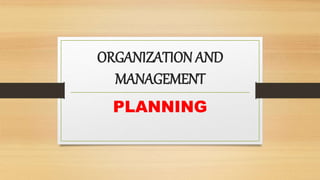
lesson-eunice.pptx
- 2. PRAYER
- 5. Objectives: • The students will be able to; 1. Understand the nature of planning 2. Understand the different types of plans. 3. Describe the different level in the firm. 4. Apply appropriate techniques and tools. 5. Formulate a decision from several alternatives.
- 7. LET’S EXERCISE! What do you want to be in the future?
- 8. Guide question 1.How was the activity? 2.Do you want to change your plan if ever?
- 10. Planning is basic or primary function of management Planning is the process of setting goal and selecting best course of action to each goal. It is looking ahead. Planning is deciding in advance, what to do, who is to do, how to do and when to do?
- 11. Planning bridge the gap between where we are and where we want to go. Planning provide target, they allocate resources in a coordinate manner. Planning also solve as standard for control.
- 12. Planning is mental exercise and intellectual process Planning may be long term and short term. Planning may be strategic, tactical and operational.
- 13. PRIMARY FUNCTION Functions of management largely depends upon planning. It provides the basic foundation from which all future management functions arise. GOAL-ORIENTED Plans arise from objectives. Objectives provide guidelines for planning. CONTINUOUS PROCESS It is an on going process of adapting the organization with the charge in business. FLEXIBLE Planning selects the best alternatives based on certain assumptions. There is a possibility of dead log in the functions of the management. It has one more alternative to suit future situation. MANAGERIAL FUNCTION It is found at all levels and all departments of an organization. It involves choosing the future course of action from among alternatives. NATURE OF PLANNING
- 15. Strategic Planning “Strategic plans are all about why things need to happen,” Story said. “It’s big picture, long-term thinking. It starts at the highest level with defining a mission and casting a vision.” Strategic planning includes a high-level overview of the entire business. It’s the foundational basis of the organization and will dictate long-term decisions. The scope of strategic planning can be anywhere from the next two years to the next 10 years. Important components of a strategic plan are vision, mission and values.
- 17. Planning Techniques and Tools Forecasting is making prediction of what is likely to happen in the future. Forecasting is the process of estimating the relevant events of future, based on analysis of their past and present behavior. Forecasting provides a logical basis for determining in advance the nature of future business operation. Forecasting is the basis of planning.
- 18. 2 types of Forecasting • Quantitative forecast • Qualitative forecast
- 19. Planning Techniques and Tools Contingency plan is a course of action that your organization would take if an unexpected event or situation occurs. It is an important part of your overall business continuity strategy because they can help ensure your organization is ready for anything.
- 20. Planning Techniques and Tools Scenario planning is making assumption on what the future is going to be and how your business environment will change overtime in light of the future Scenario planning is identifying a specific set of uncertainties, different realities of what will happen in the future of your business
- 21. Planning Techniques and Tools Benchmarking is another planning technique that generally involves external comparisons of a company’s practices and technologies with those of other companies.
- 22. Planning Techniques and Tools Participatory Planning • is an urban planning paradigm that emphasizes involving the entire community in the strategic and management processes of urban planning. • Often considered as part of community development. • Aims to harmonize views among all of its participants as well as prevent conflict between opposing parties.
- 23. Planning Techniques and Tools Positive results of Participatory Planning Creativity Increase acceptance Understanding of plans Commitment to the success of plans
- 24. Activity 2: “GUESS THE LOGO”
- 25. Activity: “GUESS THE LOGO” 1.
- 26. Activity: “GUESS THE LOGO” 2.
- 27. Activity: “GUESS THE LOGO” 3.
- 28. Activity: “GUESS THE LOGO” 4.
- 29. Activity: “GUESS THE LOGO” 5.
- 30. Activity: “GUESS THE LOGO” 6.
- 31. Activity: “GUESS THE LOGO” 7.
- 32. Activity: “GUESS THE LOGO” 8.
- 33. Activity: “GUESS THE LOGO” 9.
- 34. Activity: “GUESS THE LOGO” 10.
- 35. Activity: “GUESS THE LOGO” 11.
- 36. Activity: “GUESS THE LOGO” 12.
- 37. Activity: “GUESS THE LOGO” 13.
- 38. Activity: “GUESS THE LOGO” 14.
- 39. Activity 3: “GUESS THE LOGO” 15.
- 40. Key answers: 1. Netflix 2. Shell Oil company 3. Huawei 4. Nike 5. San Miguel Corporation 6. Starbucks 7. Amazon 8. Petron Oil company 9. PLDT 10. Globe Telecom 11. Meralco 12. Microsoft 13. Toyota 14. Chanel 15. Mitsubishi
- 41. Rubric GUESS THE LOGO Unity in group 10 points Synchronization in group 10 points Total 20 points
- 42. Guide question 1.How was the activity? Is it easy or difficult? 2.What are your realizations in this kind of activity?
- 43. Quiz 1.It is the process of setting goal and selecting course of action. 2.What tools in planning are often considered as part of community development or Urban planning. 3.This type of planning is carried out by Middle level managers. 4.What types of plan is in Top Level managers? 5.What types of plan is in Low level management?
- 44. 1.What is the nature of organizations? 2.What are the types of organization structures? 3.What are the different elements of delegation? ASSIGNMENT